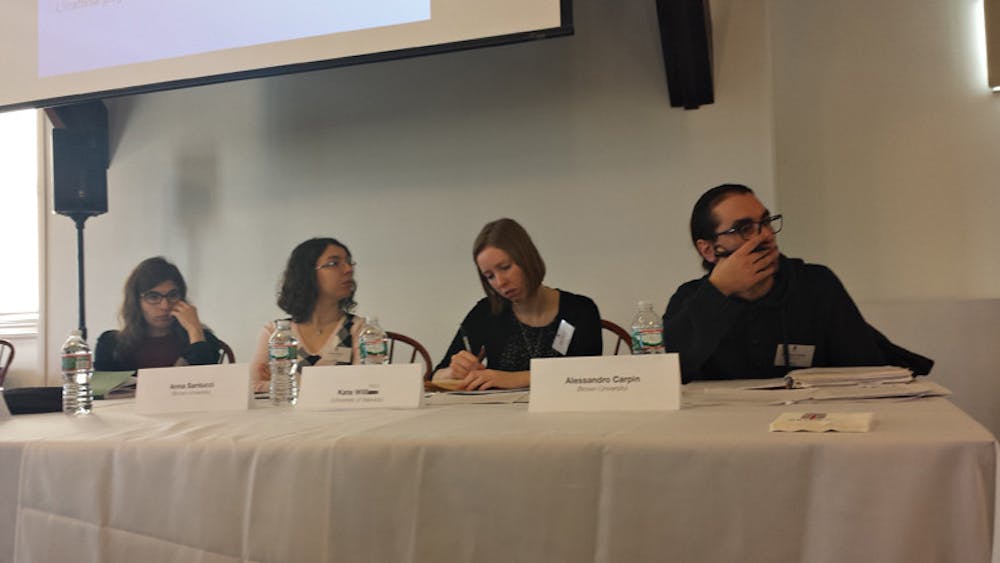Graduate students from the Italian studies programs at Brown and Harvard gathered this weekend for Chiasmi, an interdisciplinary graduate colloquium featuring 19 professors, graduate students and independent researchers, 12 of whom traveled from outside the United States to attend.
This year marks the seventh annual iteration of the initiative, which alternates locations between Brown and Harvard every year, said Lianca Carlesi GS, one of the event’s organizers.
The conference this year was “Memories: Tradition and Revision, Amnesia and Retrieval.”
Massimo Riva, professor of Italian studies and a faculty adviser for the conference, identified two key goals of the conference: “One is to offer an opportunity to students to present their research,” he said. “The other one … is networking.”
“We thought we’d explore the issues of memory — memory and war and other related issues, such as colonialism,” said Matthew Collins, a Harvard graduate student involved in the organization of Chiasmi.
“We wanted to attract as many submissions as possible,” added Wuming Chang GS, the third event organizer, also from Brown’s Department of Italian Studies. Chang said the theme of memory was meant to appeal to a broad audience. “Everything in humanities and social sciences, more or less, has something to do with memory,” he said.
The organizers said they wanted in particular to incorporate more artistic elements into the conference to break up the academic panels and attract undergraduate attendees.
Ruth Ben-Ghiat, professor of Italian and history at New York University, was the keynote speaker at the conference, delivering a speech titled “Memories of War, Wars of Memory: Italian Colonialism and its Aftermaths.”
Ben-Ghiat spoke about Italian propaganda film from the colonial period in order to understand “what (these films) can teach us about how memory works and why society decides to selectively remember things.”
“After Italy lost World War II, nobody talked about these films,” she said. “My talk (at Chiasmi) was about what these films were like, and why it’s so difficult for Italians to remember them.”
“Cultures don’t want to remember certain things,” she added. “There was a lot of shame, and it was painful to think about (World War II) because there was so much hope placed in it, and it all came crashing down.”
Friday night, Mariagrazia LaFauci ’12 performed “Alexandria,” a solo show she wrote and produced during her last semester for TAPS 1210: “Solo Performance” with Professor of Theater Arts and Performance Studies Lowry Marshall. “It’s like a senior rite of passage,” LaFauci said, adding that the class was her most difficult at Brown.
“Alexandria” was the product of stories LaFauci collected from her family members. “We have a lot of ghost stories in my family,” she said. “They’ve been building up and building up, and I felt like I really needed some place to express them and give them life.”
LaFauci shifted from character to character, giving voices to long-dead relatives and figments of her imagination. Among the various characters brought to life in her performance were Indiana Jones, her own great-grandmother and an unnamed, elderly professor. Throughout the performance, audience members were taken on a journey through “the attic in my brain,” as LaFauci put it.
Many of the stories and photographs she used had to be collected from various family members, she said. “These are things that they wouldn’t talk about until I begged them.”
Memory “has real physical presence in the world,” she added. “It infects everything that happens onwards from that time. … Memories can be so hurtful until you turn them into something that you can create with.”
Chiasmi was sponsored by not only the Italian Studies Department, but also the Watson Institute for International Studies and the departments of history, history of art and architecture, comparative literature, classics, anthropology, sociology, modern culture and media, German studies, French studies and East Asian studies.
A previous version of this article failed to include the Watson Institute for International Studies and the Department of History of Art and Architecture in the list of Chiasmi's co-sponsors.

ADVERTISEMENT




